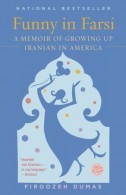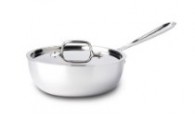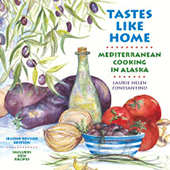 Whenever hostilities escalate between the United States and other countries, I like reminding myself that, like here, most people in those countries are just trying to live regular lives. They get up, dress their children, go shopping, clean their houses, go to work, cook dinner, and do their best to squeeze as much happiness out of life as possible.
Whenever hostilities escalate between the United States and other countries, I like reminding myself that, like here, most people in those countries are just trying to live regular lives. They get up, dress their children, go shopping, clean their houses, go to work, cook dinner, and do their best to squeeze as much happiness out of life as possible.
 Funny in Farsi and Laughing Without an Accent, by Firoozeh Dumas, are wonderfully funny memoirs of Dumas’ early life in Iran and as an Iranian American. Reading about Dumas’ big, irrepressible Iranian family, so like every Greek family I’ve ever met – indeed, so like every large American family I’ve ever met – is an easy and entertaining introduction to one slice of Iranian life.
Funny in Farsi and Laughing Without an Accent, by Firoozeh Dumas, are wonderfully funny memoirs of Dumas’ early life in Iran and as an Iranian American. Reading about Dumas’ big, irrepressible Iranian family, so like every Greek family I’ve ever met – indeed, so like every large American family I’ve ever met – is an easy and entertaining introduction to one slice of Iranian life.
In 2010, the New York Times published a Dumas story about cultural attitudes towards standing in line (Americans do and many other cultures don’t). I could’ve written that story, set in Italy, with me as an American who gets shoved to the back of the bread line over and over again because so many elderly women kept taking cuts. Seriously, this happened to me in Asti. I hold my own in Greece because I speak the language, but the little old Italian ladies kicked my butt. I never did get a loaf of bread that day. Cultures are different; people, not so much.
After enjoying Dumas’ books and stories, I started obsessing about Iranian food. Kookoo Sabzi, a dish I made last year for Persian New Year’s Day, has already become part of my permanent rotation. Now I zeroed in on “ghalyeh mahi, a fish stew containing tamarind, [a culinary specialty] of the south” that Dumas mentioned in Laughing Without an Accent.
Ghalyeh Mahi is a specialty of Iran’s Khuzestan province, which lies on the Persian Gulf and Iran’s southwest border with Iraq. Khuzestan has a rich and storied history; it was an early center of ancient civilization. It was also the heart of Iran’s petroleum industry, where Dumas’ father worked when the family lived in Iran.
Finding a recipe proved challenging. Transliterating from Persian/Farsi is imprecise, as with all languages that don’t use the Latin alphabet, so googling took awhile. Ghalieh Maahi, Ghalia Mahi, Qaliye Mahi, and Qæliye Mæhi are only some of this stew’s Latin alphabet names. While interesting, the recipes I unearthed weren’t exactly right in terms of ingredients or techniques, so I created my own version, which is delicious even if not scrupulously traditional.





